The anti-Trump: Can Evan McMullin's underdog bid in Utah determine control of the Senate?
- Oops!Something went wrong.Please try again later.
- Oops!Something went wrong.Please try again later.
- Oops!Something went wrong.Please try again later.
If you asked most political forecasters at the start of the year to list the most important Senate races of 2022, few would have put Utah among their top 10.
Enter Evan McMullin, a Republican turned independent who ran for president in 2016 and who is leaning into Utah's Senate race as a referendum on saving democracy in an era defined by threats to the electoral process.
McMullin's underdog candidacy challenging Republican Sen. Mike Lee could muddy the 2022 map for both parties, according to experts. And it may be the best yardstick on whether the country can create a post-Trump coalition of independents and disaffected conservatives who can move past the former president and his brand of politics.
"The major dividing line in American politics today is not whether you're a Republican or a Democrat or a liberal or a conservative," McMullin told USA TODAY.
"It is whether you believe in objective truth, whether you believe in democracy or not. And we've got to realize that as soon as possible in order to preserve a future for our republic, and that's what this campaign is about."
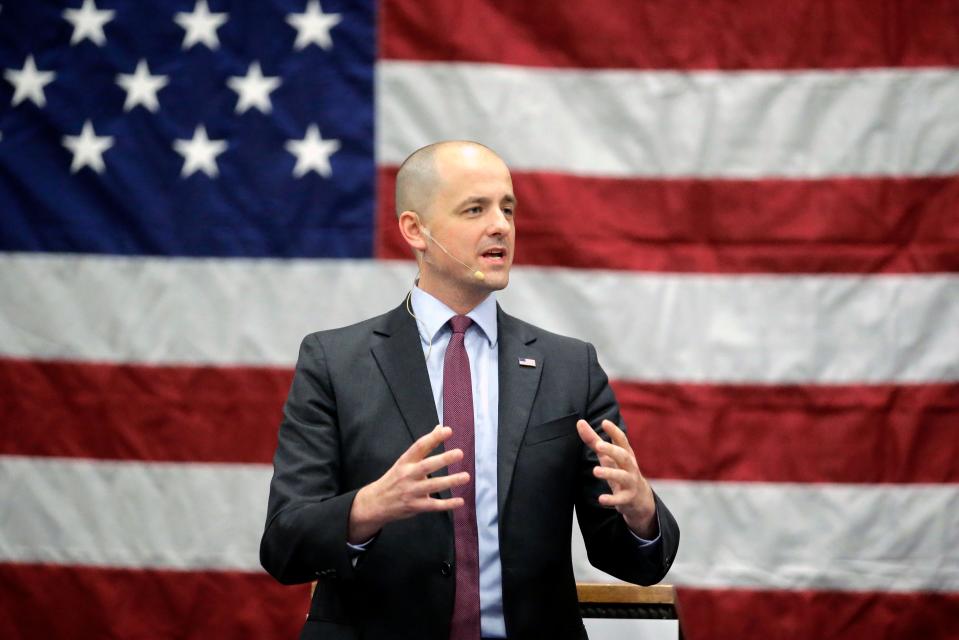
The Utah race also could have dramatic ramifications for control of the Senate.
With a tie-breaking vote from Vice President Kamala Harris giving them the majority in a 50-50 Senate, Democrats are on the defensive in battlegrounds such as Arizona, Georgia and Nevada to maintain their majority. But Republicans cannot afford to take states in their column — such as Pennsylvania and Wisconsin — for granted either.
Why campaign forecasters shift Utah
The 46-year-old former CIA officer is giving Utah its first competitive Senate contest in almost half a century.
It's a solidly red state that hasn't had a Democratic senator since 1977 and has never had an independent at that level.
But poll after poll after poll this summer has shown McMullin gaining ground and within striking distance of Lee, who had been up by as much as 24 percentage points in March,
The Lee campaign cast doubt on those surveys, saying most of the ones showing the race close were conducted among registered voters rather than likely ones.
If fundraising tallies are another indication of how close the contest is then McMullin has to be taken seriously.
Campaign finance records showed McMullin had raised more than Lee in the final three months of 2021. Since then he has kept a respectable pace, raking in $3.2 million compared to $8.1 million Lee has raised.
Federal Election Commission records show Lee has dumped $5.9 million of that haul towards his reelection with $2.4 million remaining in the bank as of June 30. McMullin has spent about $1.9 million while having $1.2 million left over.
Still, those who watch congressional contests say Utah isn't a sure bet for the GOP.
"McMullin is getting some of the breaks that he needs," said J. Miles Coleman, an associate editor of the Crystal Ball, a political analysis newsletter at the University of Virginia.
Utah Democrats, who make up less than 15% of registered voters in the state, held a contentious state convention in April where a majority of delegates voted to formally support McMullin instead of putting up their own nominee.
Utah's other senator, Mitt Romney, also gave McMullin a boost when he declined to endorse Lee's reelection, Coleman said.
As a result of those and other factors, political forecasters are changing their view of the race.
In June, Crystal Ball changed its rating of the Utah Senate race from "safe" to "likely" Republican. Last week, the nonpartisan Cook Political Report followed suit and shifted its ranking from "solid" to "likely" GOP.
Jessica Taylor, a senior editor for Cook, said Utah "merits watching" this fall, adding that Romney "denying Lee an endorsement is a victory in itself for McMullin."
What makes Utah different?
When McMullin ran for president in 2016 as part of the "never Trump" movement by some conservatives, he received less than half a percentage point of the national vote.
But in Utah, the independent contender fared substantially better, coming in third behind Democrat Hillary Clinton with 21% of the vote. Lee even publicly supported McMullin over Trump in protest.
"It's a conservative state, but the idea of Republicanism in Utah is a little bit different, because it hasn't followed some of the trends of the other red states where they've followed Trumpism,” said Trish Crouse, a political researcher at the University of New Haven.
"So it opens the door for somebody like Evan McMullin to win if he runs a good enough campaign there."
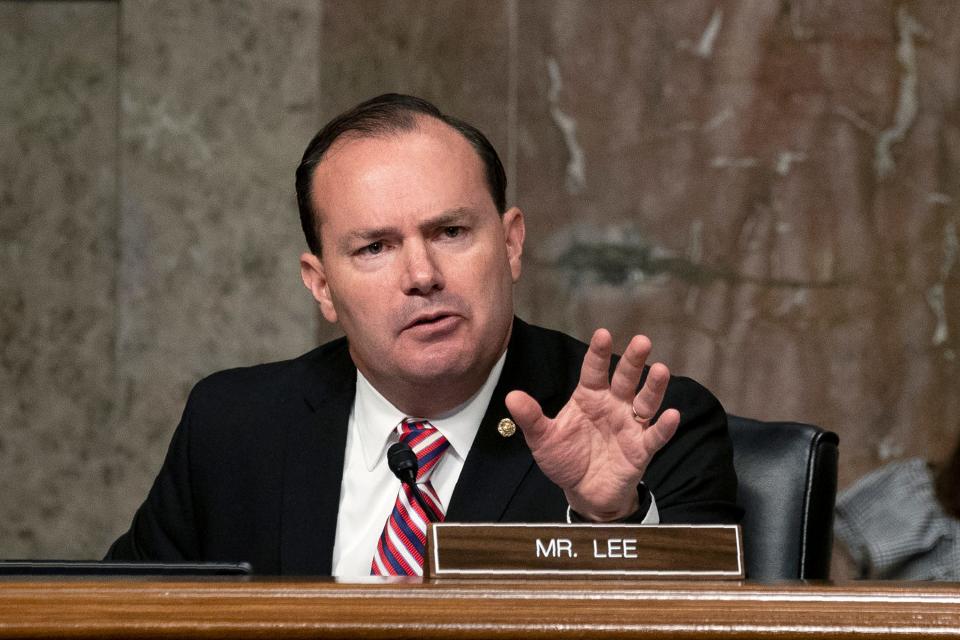
GOP Sen. Mike Lee: Iran briefing from Trump administration was 'insulting and demeaning'
More: Trump trashes election rival Evan McMullin
McMullin regularly evokes Romney as a contrast to Lee, saying the latter is one of the least productive lawmakers in Congress while the former "is willing to stand up to the extremes on both ends of the political spectrum."
As one of the seven senators who voted to convict Trump over his impeachment connected to the Jan. 6, 2021 riots, Romney has maintained support in the state.
The Deseret News and Hinckley Institute of Politics at the University of Utah asked voters there in May who they most identify with: Trump or Romney?
The poll found 51% of Utah voters said Romney compared to 37% who chose Trump and another 12% who picked neither.
Romney's firm resistance hasn't fatally wounded the senator. He holds a steady 50% approval rating in the state, according to a July survey conducted by the Hinckley Institute, with the same type of diverse political support McMullin is seeking to build.
Mormons make a difference
Crouse said what also makes Utah unique compared to other red states is its political and religious demographics.
Of the 1.8 million registered voters in the state roughly half are Republicans. The second highest group are signed up as "unaffiliated," who make up 30% of Utah voters.
The state's heavy Mormon population has always been a difficult group for Trump to navigate, Crouse said.
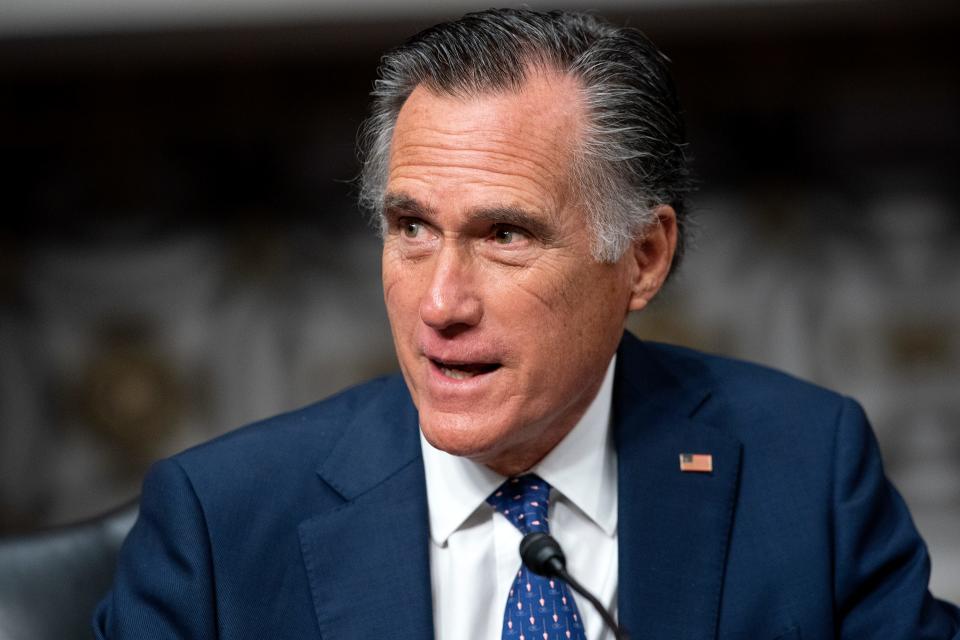
About half of Mormons who were 40 years old or younger, for example, voted for President Joe Biden in the last election, according to the 2020 Cooperative Election Study.
The pollsters said their findings showed a continued trend that younger Mormons are "less likely to fall in line with the default Republican affiliation."
Republican strategist John Freehery said it is accurate that Mormons have never warmed to Trump the way evangelical Christians have, but he argues those voters “don’t hate him either.”
In the aftermath of the 2020 election, the Associate Press released a survey showing 71% of Mormon voters supported Trump's reelection.
Besides, he said, there is no sign that a critical mass of Church of Latter-Day Saints members have turned on Lee.
“I don't think that McMullin has any chance against Lee,” Freehery said. “He's just somebody who's trying to continue to make money off of being anti-Trump.”
Someone to 'protect America'
The McMullin campaign, however, is betting on disaffected Republicans, out-of-power Democrats and frustrated independents coming together.
"The way I'm running gives us a much broader tribe, so to speak," McMullin said.
McMullin said he remains a conservative on most issues, but that he is open to negotiating with Democrats on "big ideas" surrounding the environment and gun safety.
He has pledged not to caucus with either party if elected.
Lee campaign spokesman Matt Lutsy said those sorts of comments underscore how McMullin, if elected, would ensure Democrats keep power in the Senate.
"He has refused to support Republicans in the Senate and has doubled down on the notion that he will caucus with no one. All that would do is ensure Utahns were left voiceless in the Senate," Lutsy said.
Thom DeSirant, executive director of the Utah Democratic Party, said it was a tough decision when delegates chose to back McMullin over their own nominee during the state convention this year.
About 43% of Utah Democrats voted to oppose the move, he said.
"Because Evan's not tied to the far-right base, we feel that he'll actually give us the time of day even if he doesn't always vote the way that we want him to," DeSirant said.
What's uncertain is what, if anything, national Democratic groups might do.
DeSirant said the state party has reached out to the Democratic Senatorial Campaign Committee about its plans for Utah in the fall but hasn't heard back.
"I'm not thrilled with a lot of his policy positions," DeSirant, the Utah Democrat, said. "But right now, with Mike Lee, the bar is low enough that I just want someone who will protect America."
Anti-Trump conservatives struggling
What doesn't bode well for McMullin nationally is that "never Trump" conservatives aren't doing well in the 2022 primaries.
In some of the most prominent races, such as for Arizona governor, the Trump-backed candidates have easily prevailed over more traditional Republicans backed by other party leaders.
Feehery, the GOP strategist, said the midterms have shown MAGA base has overtaken the GOP and has little patience for conservative candidates who quarrel with Trump.
Trump's continued influence: Donald Trump, power broker: Primaries show he retains a degree of control over Republicans
"They still like the president," he said. "If you look at the polls, he's still got a pretty strong handle on the party."
That includes Trump-backed candidates winning primaries in important battleground states for Senate and governor such as Pennsylvania’s Mehmet Oz and Doug Mastriano; Arizona’s Blake Masters and Kari Lake; Michigan’s Tudor Dixon; and Ohio’s J.D. Vance.
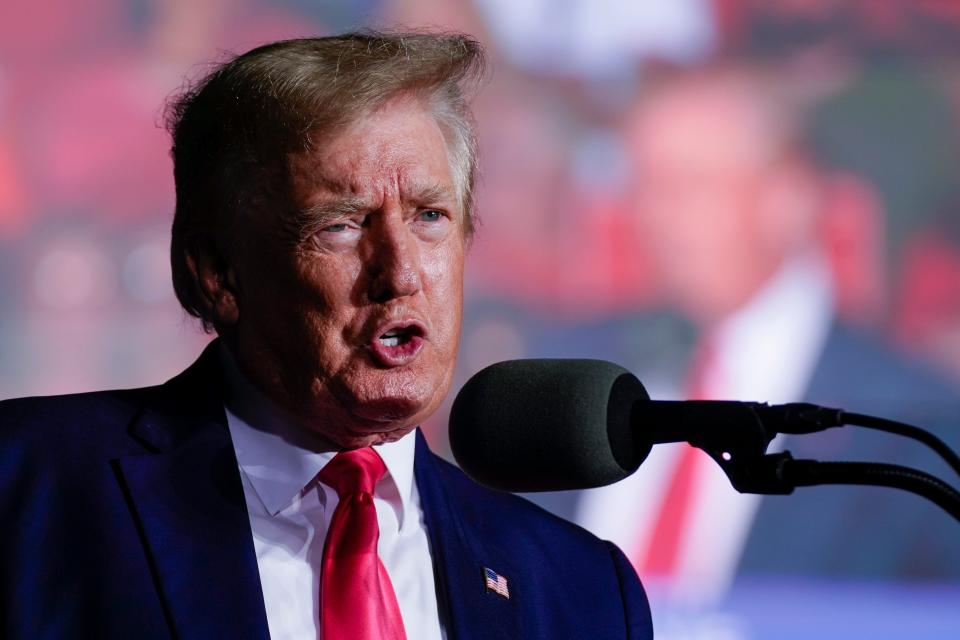
Among the 10 House Republicans who voted to impeach Trump over the Jan. 6, 2021 riots at the U.S. Capitol, only two survived the former president's promise to purge them out of the GOP with the others either retiring or losing.
The most recent was Rep. Liz Cheney, who was defeated by a greater than 2-1 margin this month by political activist Harriet Hageman, a natural resources attorney, for Wyoming's at-large congressional seat. It is one of the largest losses for a House incumbent in U.S. history, according to analysts.
Georgia was of the few anomalies in the 2022 primary season with Gov. Brian Kemp beating back his Trump-backed primary opponent. But Feehery said that was largely due it being a "one-sided feud" with a popular incumbent.
"If you bet against Trump, especially in the primaries, and continue to double down, you're going to lose," Feehery, the GOP strategist, said Tuesday.
Liz Cheney: How she went from Trump backer and GOP leader, to his fiercest critic and GOP outcast.
McMullin has taken notice of what's happening outside of Utah but believes Trump's influence over the GOP is "weakening" since leaving the White House.
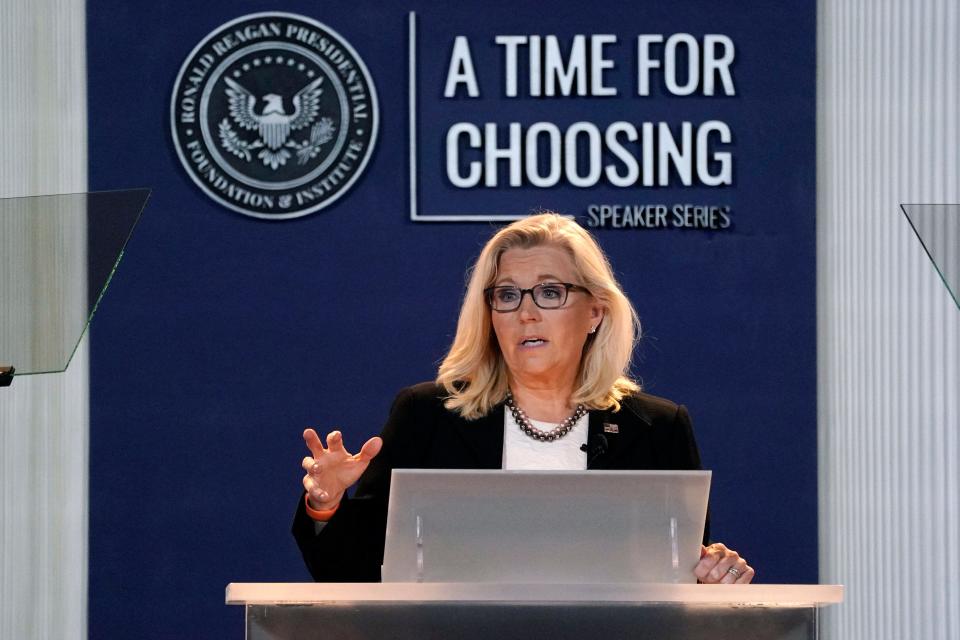
The McMullin campaign points to several polls showing Florida Gov. Ron DeSantis running ahead of Trump for the 2024 GOP presidential nomination. It also notes how a December 2021 survey showed 53% of Utah voters don't want the former president to run again.
But McMullin said he concurs that getting the GOP to ditch Trump isn't going to happen in one election cycle or through one Senate race.
Still, he said, the country cannot wait to choose a different type of politics.
"The reality is that he still wields the most influence over the party more than anyone else, and it is just not enough for the party to change or for any of us to expect the party to change course soon."
This article originally appeared on USA TODAY: Evan McMullin is the anti-Trump candidate of 2022. Can he win in Utah?

